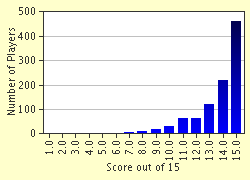Quiz Answer Key and Fun Facts
1. Which British queen gave her name to a type of sponge cake?
2. Which of these is an annual race between Putney and Mortlake in London?
3. The pudding traditionally eaten with roast beef has the same name as which English county?
4. Where is the official residence of the British Prime Minister?
5. In what part of the UK is haggis traditionally eaten?
6. Legend says that St. George, the patron saint of England, slew what type of creature?
7. The vegetable leek is the emblem for which part of the UK?
8. In which of these countries is "Pommy" (Pommie) a term used for the English?
9. What would you do with a "toad-in-the-hole"?
10. According to legend the nursery rhyme "Ring a Ring a Roses" (or "Ring Around the Rosy") relates to which 17th-century British disaster?
11. In 2002 Liverpool Airport was renamed as a tribute to which member of the Beatles?
12. Wimbledon is famous for which type of annual sporting tournament?
13. A "Cockney" comes from which of these British cities?
14. The Channel Tunnel, linking the UK to the rest of Europe, runs between England and which country?
15. Which of these statements is true about unmarked English mute swans?
Source: Author
musicmonkeyman
This quiz was reviewed by FunTrivia editor
sunfloweruk23 before going online.
Any errors found in FunTrivia content are routinely corrected through our feedback system.


